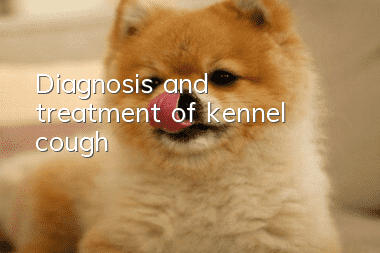Diagnosis and treatment of kennel cough

Key points for diagnosis of kennel cough:
1. Diagnose based on medical history and typical clinical symptoms. Have you been in contact with a sick dog recently? Do you have a coughing sound like retching?
2. Perform bronchoscopy. It can be seen that the bronchial mucosa of the sick dog is congested, brittle, thickened, and there is a large amount of secretions and excretions in the bronchus. The tracheal cleaning fluid and throat materials are taken to isolate, culture and identify Pathogens.
3. X-ray inspection. In dogs with severe mixed infection, X-ray examination shows thickening of the lesions in the lungs.
4. Pathological examination. Sick dogs will be found to have increased tracheal inflammatory exudation and mucus secretion, as well as swelling, congestion, and inflammation of the nasal cavity, throat, and tracheal mucosa. Pathological sections were made, and microscopic observation revealed a large number of hyperplasia and hypertrophy of mucus glands in the submucosal layer, an increase in mucosal epithelial goblet cells, the formation of mucus plugs in small bronchioles, acinar atrophy, and pus cells in the bronchial lumen.
5. Agglutination test. Collect blood from sick dogs, place the blood samples in agglutination plates, then add serum containing specific antibodies, and observe in an electrolyte environment. After a period of time, the serum agglutinates the red blood cells into visible clumps, indicating that an agglutination reaction has occurred, and kennel cough can be diagnosed at this time.
Treatment methods for kennel cough:
1. Antiviral treatment can be completed by oral administration or injection of antiviral drugs. Common oral liquids include isatis granules and injection drugs. Usually Qingkailing injection and so on.
2. Antibacterial and anti-inflammatory treatment, Aqitaineng injection, ampicillin, kanamycin, dexamethasone, etc. are commonly used, and at the same time, sterile saline plus gentamicin is used for inhalation mist chemical treatment.
3. Antitussive treatment. A very obvious feature of kennel cough is cough. In order to relieve the cough, antitussives and bronchodilators are used. At the same time, you can take oral administration of acetaminophen syrup or carbocysteine. Some dogs may develop asthma. For this symptom, aminophylline is usually injected intramuscularly.
4. The treatment of kennel cough requires formulating a treatment plan based on the symptoms. Therefore, once you find that your dog may be sick, you must send it to a doctor for treatment and do not try it on your own.
- Can dogs get arthritis? What causes dogs to get arthritis?
- How to help puppies increase their resistance? A must-read for novices!
- Diagnosis, prevention and treatment of periodontitis in dogs
- Dog won't eat or drink, loses energy and vomits
- What can a dog eat to induce an abortion?
- What should I do if my dog keeps peeing when he's not at home?
- What are the causes of vomiting and diarrhea in dogs? Find the cause and prescribe the right medicine!
- Dog keeps coughing and foaming as if stuck
- How to train a Corgi to sit for a long time? The correct way to train a Corgi!
- What are the characteristics of German Shepherd dogs?



